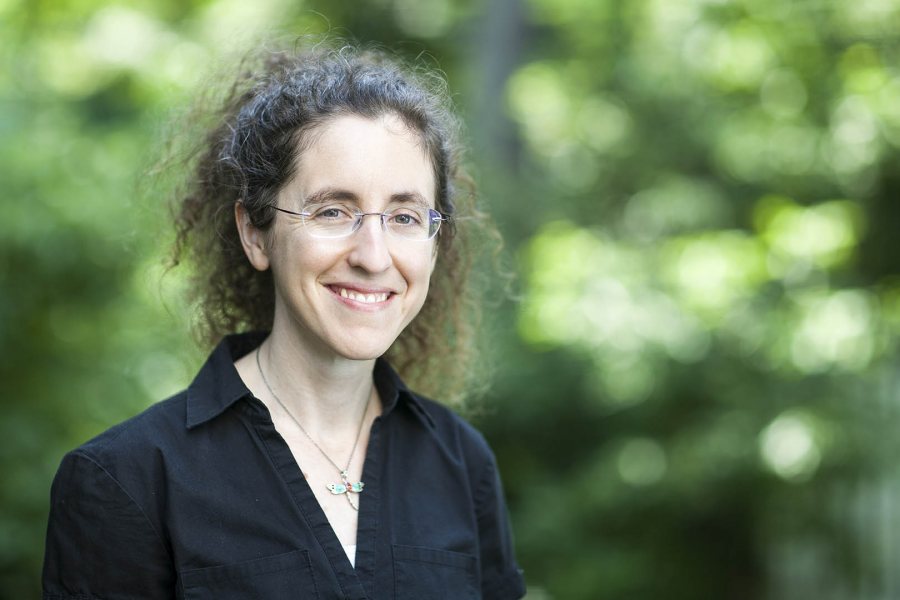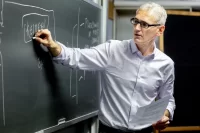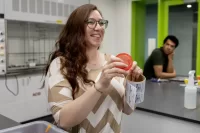Bates welcomes new faculty: Carla Essenberg, biology

Carla Essenberg, a pollination ecologist, joined the Bates biology faculty as assistant professor in August 2015. (Josh Kuckens/Bates College)
When you see a bee stuffing its pollen baskets in a field of flowers, economics may not be the first science that comes to mind. But it’s more relevant than you might think.
For bees and other insect pollinators, “foraging behavior is a lot like economics,” says Carla Essenberg, a pollination ecologist who joined Bates as assistant professor of biology in August. “We think about the costs and benefits of different things, and how the animal can maximize the benefits it gets.”
Essenberg studies how insect pollination behavior affects plants — and, perhaps more surprising, how plants interact through their pollinators, both within a plant species and between species.
“If two plant species share pollinators, they can help each other,” she says. For instance, “sometimes having another plant species growing nearby can increase the number of pollinators in the area, so that a plant might get more visitors.”
Meet other tenure-track faculty members new to Bates in fall 2015:
“But they can also harm each other,” Essenberg adds. A species very attractive to pollinators might monopolize them, to the detriment of neighboring species. Or insects may carry pollen between species, wasting it for reproduction, if not bee nourishment. Some species’ pollen can even poison the stigmas of other species.
Essenberg doesn’t focus on the threats to the honeybee that are so prominent in the news, but her work is certainly related. “Most plant species use animal pollinators, at least to some extent, to achieve sexual reproduction,” she says (as opposed to asexual propagation, such as forming runners).
“Many of our favorite foods rely on animal pollinators to get decent yields — coffee, chocolate, fruits and nuts, and so on.” The essential importance of pollination, she says, is “a big part of why I ended up studying this area.”
More broadly, Essenberg wants to raise awareness of so-called ecosystem services, of which pollination and consequent food production are one example. “We all need to be aware of the degree to which our standard of living relies on natural ecosystems,” she says, and in turn, “how our way of living affects whether those systems will continue to support us.”
“I realized kind of late that it was important for me that my work mattered beyond my own life and satisfaction,” Essenberg explains. “It needed to benefit other folks.
Pollen foraging behavior is a lot like economics.
“That’s what got me into ecology. I saw this as a way my research could improve the ability of people to manage land, and get things we need from the natural environment with the fewest possible long-term impacts.”
How do you study pollinators? In her lab, Essenberg keeps bumblebee colonies that she exposes to artificial flowers. (The bees can be ordered from green-agriculture companies like Koppert Biological Systems and Biobest.) “You can manipulate the bees’ sensory cues, how the flowers are distributed, and the rewards from pollination. And so you see how the bees respond.”
There’s also fieldwork, of course — pollinating wildflowers, collecting stigmas, observing pollinator behavior and so on. It’s something that “you do on warm, sunny days,” she says. “Going out and looking at wildflowers — it doesn’t get much better than that. And I’ve always enjoyed looking at insects, especially bees.”
Essenberg, who encourages her students to take the lead in research she does with them, says that the value of studying science transcends specific lessons or benefits that research produces.
The basis of science, she says, “is that you don’t just assume that what somebody’s told you is right.” The scientific method, she explains, is an algorithm for creating knowledge. “That’s very powerful for anybody.”
Essenberg and her husband, Tim Stott, a therapist, live near campus. In her spare time, she enjoys hiking, dancing and making music: a devotee of Renaissance music, she plays folk harp and viola da gamba, and has dabbled with such early wind instruments as recorder and crumhorn.
Essenberg comes to Bates from the University of Arizona, where she was a postdoctoral research associate at the Center for Insect Science. Her undergraduate degree, from St. Olaf College, is in philosophy and music. She received a doctorate in evolution, ecology and organismal biology from the University of California, Riverside.



